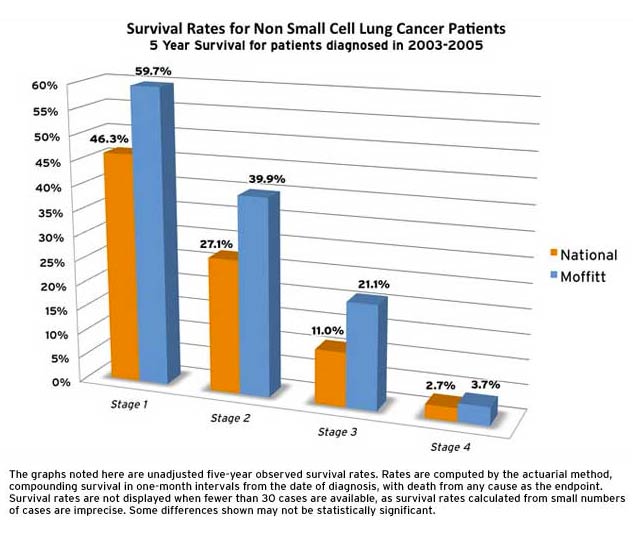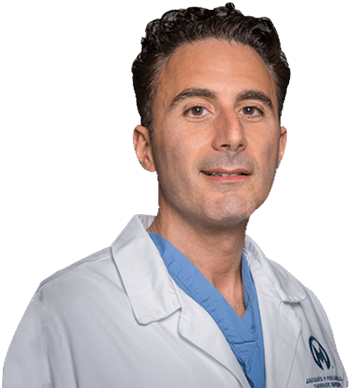Call Now
Lung cancer is among the most common cancers in the U.S. Dr. Jacques Fontaine is a lead lung cancer treatment expert and thoracic surgeon at Moffitt Cancer Center in Tampa, Florida, where patients receive multidisciplinary care that offers the best chance of survival.
Understanding Lung Cancer
Lung cancer is the second-most common cancer in men and women and the No. 1 cause of cancer death in the U.S., making up nearly 25% of all cancer deaths.
Smoking is the leading cause of lung cancer. Other causes of lung cancer include exposure to secondhand smoke, air pollution, radiation, radon and asbestos. Asbestos exposure also causes a rare cancer known as mesothelioma, which is a type of cancer that develops in the lining of the lungs and is often mistaken for lung cancer.
Common symptoms of lung cancer include:
- Cough that persists or worsens
- Coughing up rust-colored sputum or blood
- Shortness of breath
- Wheezing
- Hoarseness
- Chest pain
- Lung infections that the persist or keep returning
- Fatigue
- Loss of appetite or weight loss
Who Is at Risk of Developing Lung Cancer?
Most people diagnosed with lung cancer are 65 years of age or older. Current and former smokers are most at risk and account for nearly 80% of lung cancer deaths.
Radon exposure is responsible for approximately 12% of lung cancer cases in the U.S., and asbestos exposure causes about 4% of cases. Anyone with a history of asbestos exposure is at risk of developing lung cancer, mesothelioma, laryngeal cancer and ovarian cancer.
Who Should Be Screened For Lung Cancer?
Importance of a Lung Cancer Specialist
Seeking the expert opinion of a lung cancer specialist is essential to ensure you are receiving the best treatment possible for your unique case.
Qualities of a good lung cancer doctor include:
- Education and Training: Look for a doctor who specializes in lung cancer treatment. The best doctors have trained under other lung cancer specialists through residency and fellowship training.
- Experience: Find a doctor who has years of experience treating people with lung cancer.
Bedside Manner: Find a lung cancer specialist you feel comfortable talking with and trust. - Research: Doctors involved in clinical trials or laboratory research are on the cutting edge of lung cancer treatment.
Dr. Jacques Fontaine has trained under several lung cancer specialists in addition to mesothelioma specialists. He began treating lung cancer patients during his residency at the University of Montreal, and is known for his caring bedside manner in addition to his expertise as a thoracic surgeon. Fontaine has conducted lung cancer research for more than a decade, and lung cancer clinical trials are a cornerstone of research at Moffitt Cancer Center.
Diagnosing and Treating Lung Cancer
A lung cancer specialist uses several tools to diagnose and treat the disease. For example, PET scans and biopsies are important diagnostic tools, and surgery, chemotherapy and immunotherapy are used for treating lung cancer.
Palliative treatment options reduce the severity of symptoms and can also prolong survivability. For example, inserting a PleurX catheter to drain a pleural effusion is a simple procedure that markedly improves breathing effort and reduces chest pain.
Dr. Jacques Fontaine of the Moffitt Cancer Center in Tampa, Florida discusses the importance of preventative lung cancer screening.
Lung Biopsy
If a lung nodule is deemed suspicious, a lung biopsy is recommended. There are various methods of performing a biopsy and each have advantages and disadvantages.
The different biopsy options available to patients with lung cancer include:
Percutaneous Needle Biopsy: A CT scan is used to locate the nodule and a long, thin needle is placed into the chest to sample the nodule. Depending on the size and location of the nodule, there is a possibility this biopsy method may miss the nodule or not obtain enough sample to accurately provide a diagnosis.
Navigational Bronchoscopy: A bronchoscope uses a small camera with a GPS-like system that is introduced through the mouth and into the airway to perform the biopsy. Nodules located far from the airway are difficult to reach with this technique, which means the biopsy may not provide an accurate diagnosis.
Surgical Biopsy: A minimally invasive approach, such as video-assisted thoracoscopic surgery (VATS) or robot-assisted surgery, is used to remove the whole nodule rather than a sample. A preliminary result is obtained within a few minutes while the patient is still under general anesthesia. If the nodule is cancerous, surgery is completed at that moment. A surgical biopsy is both diagnostic and therapeutic because it is the definitive treatment for early-stage lung cancer and offers the best chance of a cure.
Staging Lung Cancer
Stage identifies how far the cancer has advanced. A combination of CT and PET scans, among other tests, determines lung cancer stage.
- Stage I: Cancer growths are small and malignant cells have not spread to the lymph nodes. Tumors this small and contained can often be removed through surgery alone.
- Stage II: Cancer has traveled to the hilar lymph nodes, around the root of the lung. Patients at this stage can usually benefit the most from a combination of surgery and other treatments such as chemotherapy, immunotherapy or radiation.
- Stage III: Cancer has spread to the mediastinal lymph nodes around the trachea (windpipe). Though this stage is advanced, patients in otherwise strong health may still be eligible for a combination treatment plan that includes surgery.
- Stage IV: Cancer has metastasized to the pleura (lining around the lungs) or to other organs. Surgery is usually not recommended at this stage, but patients may benefit from chemotherapy, immunotherapy or radiation therapy.
Why Choose Moffitt and Dr. Fontaine for Your Lung Cancer Treatment?
Moffitt Cancer Center is successful for a number of reasons: It focuses solely on the treatment and prevention of cancer, and more than half of its Tampa-based staffers are researchers breaking new ground in the search for a better way to treat these cancers.
Innovation is also important. Moffitt takes a personalized approach to treatment that includes the latest immunotherapy drugs and clinical trials.
Fontaine provides lung cancer patients at Moffitt the best possible care. In fact, a report from the National Cancer Institute shows lung cancer patients treated at Moffitt have higher survival rates than the national average.
That’s why patients and their loved ones from cities across Florida, including St. Petersburg, Clearwater, Sarasota, Lakeland, Fort Myers, Naples and Lakeland, choose Fontaine and Moffitt over other specialists and cancer centers. Residents beyond Hillsborough County and the Tampa Bay area travel to Moffitt to access top-notch care.
In addition to innovative treatment options and a multidisciplinary approach to cancer care, Moffitt Cancer Center offers a variety of support resources, including weekly support groups for patients and loved ones. By connecting with other survivors in Tampa and surrounding communities, patients can learn more about their disease.
Fontaine and Moffitt have developed personal relationships with oncologists around the state, allowing for a seamless, well-coordinated treatment plan. Patients can start treatment in their hometown, travel to Moffitt for surgery and return home to continue their treatment plan.







